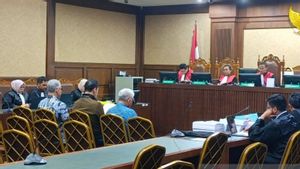Turkish President Tayyip Erdogan on Tuesday declared a state of emergency in 10 provinces destroyed by two earthquakes that killed more than 5,100 people and left traces of destruction in southern Turkey and neighboring Syria.
The day after the earthquake struck, rescue teams working in hard conditions struggled to get people out of the rubble of collapsed buildings, "circumventing with time".
As the scale of the disaster becomes clearer, the death toll appears to be increasing significantly. A UN official said it was feared thousands of children might have died.
Thousands of buildings collapsed, hospitals and schools were destroyed and tens of thousands of people were injured or homeless in several cities of Turkey and Syria due to the 7.8 magnitude earthquake, the deadliest in Turkey since 1999, followed by a second earthquake an hour later.
Extreme winter weather hampered rescue efforts and aid deliveries, making the situation of the homeless even more sad. Some areas are fuelless and electricity.
Aid officials voiced special concerns about the situation in Syria, which has been hit by a humanitarian crisis after nearly 12 years of civil war.
In a speech on Tuesday, President Erdogan declared 10 affected Turkish provinces a disaster zone and imposed a state of emergency in the region for three months.
This will allow the president and cabinet to ask parliament to enact new laws, to restrict or suspend rights and freedoms.
Pemerintah berencana untuk membuka hotel di pusat pariwisata Antalya, di sebelumnya menampung orang-orang yang terkena gempa, kata Presiden Erdogan.
The death toll in Turkey has risen to 3,549 people, President Erdogan said. Meanwhile in Syria, the number of victims reached more than 1,600, according to the government and rescue services in the northwest controlled by rebels.
Presentation to the Executive Board of WHO about the earthquake in #Türkiye and #Syria by the Director-General @DrTedros & Executive Director of WHO's Health Emergencies Programme @DrMikeRyan👉 9:00 am CETMore information:https://t.co/xCIxFgCxNY
— World Health Organization (WHO) (@WHO) February 7, 2023
Separately, the World Health Organization (WHO) said it was "deeply concerned" about areas in Turkey and Syria where communication was difficult.
"Now it's a race against time," said WHO chief Tedros Adhanom Ghebreyesus, explaining that the UN health agency is sending much-needed aid to the area, citing The National News.
"We are mobilizing emergency supplies and we have activated the WHO's emergency medical team network to provide essential health care for the injured and the most vulnerable."
In addition to the increasing number of deaths, Dr. Tedros said the downturning temperature made things worse.
"The figures don't tell us about the dangerous situations many families face now, lose everything, are forced to sleep outside in the middle of winter," he said.
Meanwhile, the Turkish Disaster and Emergency Management Authority (AFAD) said 5,775 buildings had been destroyed by the earthquake and 20,426 people were injured.
Meanwhile, UN humanitarian officials in Syria said fuel shortages and bad weather created obstacles.
"Infrastructure is damaged, the road we usually use for humanitarian work is damaged," UN resident coordinator El-Mostafa Benlamlih told Reuters from Damascus.
Bad internet connections and damaged roads between some of Turkey's worst-affected cities, homes to millions of people, have also hampered efforts to assess the impact and plan aid.
As a form of support, rescue teams from 70 flying countries to support the 24,400 emergency personnel currently working in Turkey. Meanwhile, Syrian opposition rescue workers, known as White Helmet, have asked for heavy equipment to help.
Meanwhile, 17 European Union countries have offered assistance to Turkey in the form of a search and rescue team. More than 1,100 rescuers and 72 search dogs are heading to Turkey, with the first wave arriving on Monday.
#EUCivilProtection response to Türkiye #earthquake:⁰17 EU countries 🇦🇹🇧🇬🇭🇷🇨🇿🇪🇪🇫🇷🇬🇷🇭🇺🇮🇹🇲🇹🇳🇱🇵🇱🇷🇴🇸🇰🇪🇸🇵🇹🇩🇪 together with 🇦🇱🇲🇪 have offered 25 search & rescue and 2 emergency medical teams.⁰1155 rescuers & 72 search 🐕🦺 are heading to 🇹🇷, the first teams having arrived yesterday. pic.twitter.com/NRfIUGDW9s
— EU Civil Protection & Humanitarian Aid 🇪🇺 (@eu_echo) February 7, 2023
The English, Chinese, Japanese, Arabic, and French versions are automatically generated by the AI. So there may still be inaccuracies in translating, please always see Indonesian as our main language. (system supported by DigitalSiber.id)













